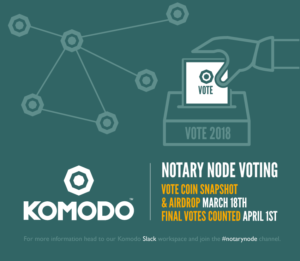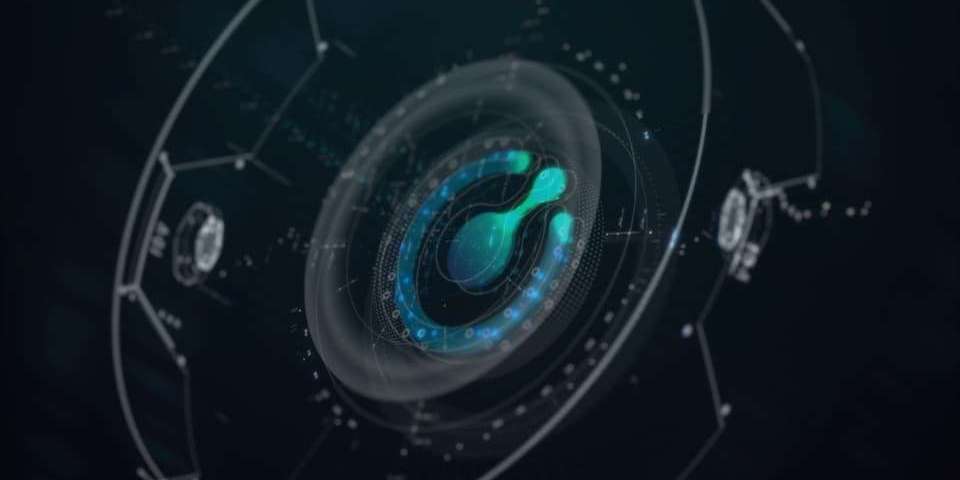The 2018 Komodo Notary Node Elections are rapidly approaching and we here at Komodo are pleased to be holding our second annual election.
We thought now would be the perfect time for an in-depth look at what the Notary Node Elections are and how exactly they work. Whether you’re a $KMD noob or a long-term hodler, this post will answer all your questions and explain everything you need to know.

What’s A Notary Node?
First things first: what’s a notary node? Before we can answer this question, we need to talk a little bit about how the Komodo blockchain works.
The Komodo blockchain uses a security mechanism called Delayed Proof of Work (dPoW). It is similar to the consensus mechanism used by the Bitcoin blockchain—called Proof of Work (PoW)—but it has an additional layer of security added to it.
Just as with a PoW consensus mechanism, all of the computers on Komodo’s dPoW network must approve a mathematical result before a transaction is executed. In addition, the Komodo blockchain also creates a backup of itself onto the ledger of a different blockchain. This process is called notarization and it occurs roughly every ten minutes. There are 64 servers on the Komodo Platform network dedicated to performing this unique notarization process.
As you may have already guessed, these 64 dedicated servers are called notary nodes. The notary nodes carry out three specific steps to ensure that the notarization process is properly completed:
- Gather Data – the notary nodes collect data about the Komodo blockchain and write that information into a special block on the Komodo blockchain.
- Notarize Data – Once the block with the backup info has been created, it is then notarized onto a different blockchain for added security. The blockchain used to backup the data is currently Bitcoin, as Bitcoin has the largest network and is thus the most secure blockchain to date. However, Komodo can, at any point in time, choose to change the blockchain onto which the data is notarized.
- Re-Notarize Back Onto The Komodo Blockchain – After the backup has been created on the secondary blockchain, the location of the backup is then written back into Komodo’s main blockchain. As the Komodo ecosystem relies on these backups to ensure that the history of the Komodo ecosystem is accurate, an attacker would have to break the Bitcoin network first in their effort to alter or disrupt the history of the Komodo blockchain.
This is quite a bit of work for the notary nodes. As such, they are periodically rewarded with an opportunity to easily mine a Komodo block and receive the corresponding reward. This provides incentive for individuals with experience in system administration to commit their resources to becoming a notary node. It’s simply a form of compensation for their time and expertise.
It’s important to state clearly that notary nodes are not chosen by the Komodo Platform core team. Instead, 30 of the notary nodes are elected each year by the Komodo Platform community: anyone who holds $KMD (and the corresponding private keys) is allowed to vote.
Only 30 of these positions are selected via the election process because there are 4 designated developer nodes, plus an additional 30 notary nodes are automatically re-elected as a result of exemplary service in the previous year. The remaining 30 notary nodes are chosen through the Komodo Platform community elections.
How Do The Notary Node Elections Work?
As we just stated, every single holder of $KMD is allowed, and strongly encouraged, to participate in the Notary Node Elections. (The only catch is that you must be holding your $KMD in a private wallet and have the private keys.) Here’s how the process will work:
On March 18th at 9:00pm UTC, every individual who owns $KMD (and the private keys to that $KMD) will be given special tokens called VOTE2018. The VOTE2018 tokens will be distributed at 1:1 ratio of the $KMD held by each person. This means the election is stake-weighted: those who hold more $KMD have more votes to cast and therefore a bigger say in who becomes notary nodes. After the VOTE2018 tokens have been distributed, $KMD holders can vote with them by sending them to their desired candidate(s).
There are two options for casting your ballots. The first is to send any quantity of VOTE2018 tokens to the candidate(s) of your preference. This will work the same way as sending any other coin or token would. If you felt so inclined, you could send 0.5% of your VOTE2018 tokens to 200 different notary node candidates. Or you could send 99.9% of your tokens to one candidate and 0.1% to another. And so on. You can manually send tokens in any amount, to any candidate.
The second option is to use the “voting” section of your Agama wallet, which will appear after the VOTE2018 tokens have been distributed. There will be four empty fields into which you may enter Komodo addresses of your preferred candidate(s). This means you may cast your ballot in chunks that represent 25% of your total VOTE2018 tokens.
We’ve created this option for the sake of convenience. It is by no means a requirement to dole out your VOTE2018 tokens out in 25% bundles. We just thought it might make life easier.
Selling VOTE2018 tokens is strictly prohibited. Anyone caught buying or selling VOTE2018 tokens in exchange for $KMD, or any other currency, will be disqualified from the elections. Apart from that, you may do whatever you wish with your VOTE2018 tokens.
The voting will close on April 1st at 3:00pm UTC. At that time, the 30 candidates with the most VOTE2018 tokens in their wallets will become notary nodes.
How Does One Become A Notary Node?
All of this might have you wondering how to become a notary node. The short answer is to enroll as a candidate and be one of the 30 highest recipients of VOTE2018 coins. The longer answer requires a bit more information.
Komodo Notary Nodes are responsible for running and maintaining Komodo's securities services (dPOW) and therefore require a strong technical skill set. This means notary node candidates must meet a few minimum hardware requirements.
Komodo’s Notary Node Software currently only works on Linux. As such, potential candidates must use Ubuntu x64 - 14.04 or 16.04 minimal installation with Openssh server. In addition, anyone who wishes to become a notary mode must posses a server with:
- A good CPU (e.g. Xeon or i7)
- At least 64GB of RAM
- At least 500GB SSD of disk space
- Fast uplink of at least 100Mbps and very strong network connectivity
For those who are interested in learning more about the requirements of becoming a notary node, please refer to the full technical requirements and setup guide.
Although it's not a requirement that you hold any amount of $KMD to qualify as a notary node candidate, a high level of competence in systems administration is absolutely essential. It’s also required that you be willing to dedicate your time and skill set to the maintenance of your notary node(s).
Individuals who meet these requirements are eligible to run in the Notary Node Elections. Those who are running to become a notary node may campaign, meaning they may announce the fact that they are running and explain to the Komodo Platform community why they feel they’re a strong candidate.
We should add that these requirements are not meant to discourage anyone from participating in the Notary Node Elections—quite the opposite. We encourage anyone who is interested to become a notary node candidate and run in the elections. We simply want to be clear about the time and technical expertise that will be required for notary nodes to perform their duties.
There is only one rule for persons running in the Notary Elections: any relationships with other notary node operators and/or candidates must be disclosed to the public. This includes members of the Komodo team. (Komodo core team members must also announce to the public that they are, in fact, a part of the Komodo core team.) These requirements are in line with Komodo’s beliefs in transparency and freedom.
As previously mentioned, Komodo does provide an incentive for individuals to become notary nodes. In particular, each notary node is periodically allowed to mine an “easy” Komodo block, which allows them to receive the corresponding reward. Notary nodes can reasonably expect to make roughly 1800 $KMD per month in exchange for their contributions to the Komodo Platform community.
Again, we highly encourage anyone who is interested to become a candidate in the Notary Node Elections. We also highly encourage every single $KMD holder to participate in the elections by casting their ballot!
Finally, if you have any questions at all, please reach out directly to our Election Master, @kolo. He’ll be happy to answer any questions that you may have. We look forward to hearing from you and to kicking off the 2018 Komodo Platform Notary Node Elections!
📧Komodo Newsletter
If you'd like to learn more about blockchain technology and keep up with Komodo's progress, subscribe to our newsletter. Begin your blockchain journey with Komodo today.
